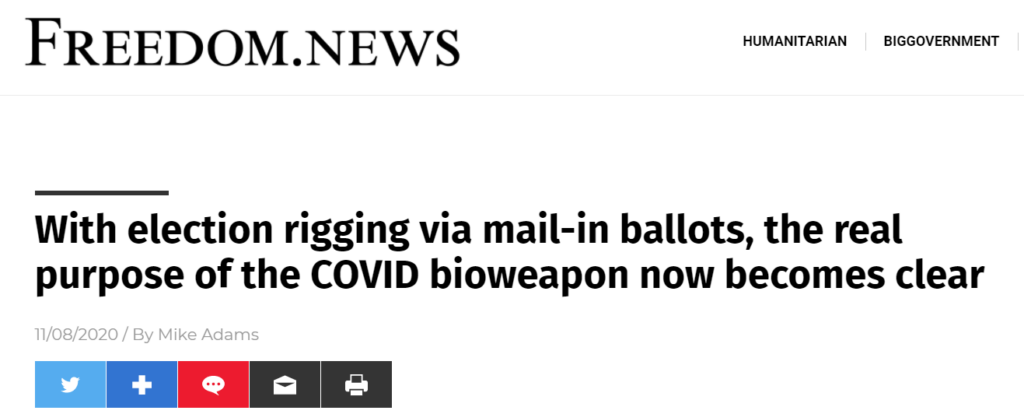Nearly two-thirds of sites publishing election misinformation have also pushed COVID myths
Editor’s Note: As of February 2024 the Misinformation Monitor is now Reality Check, a weekly newsletter on misinformation and media online. Learn more and subscribe here on Substack.
By Gabby Deutch and Chine Labbe
Additional reporting by Virginia Padovese, Marie Richter, Bron Maher, and Kendrick McDonald
The big story … Nearly two-thirds of sites publishing election misinformation have also pushed COVID myths
Of the 134 sites that NewsGuard has identified as publishing materially false information about the 2020 U.S. election, 84 of them — 63 percent — have also published misinformation about the coronavirus pandemic. This is concerning, but not surprising; most of these sites already had a history of publishing conspiracy theories and hoaxes prior to both the coronavirus pandemic and the U.S. election.

Breaking it down: Some of the sites on the list are familiar standbys, known for publishing conspiracies on any and all topics.
- The website of David Icke, the ex-British footballer now known for claiming that the world is under the control of shape-shifting aliens, does not miss an opportunity to join a conspiracy: Last week, his site’s home page said “There is no virus,” and he has advanced the debunked theory that a software program called Scorecard altered votes to tip the election to Joe Biden.
- The NaturalNews.com network is a group of hundreds of health-focused domains with deceptive names like FactCheck.news and WhiteHouse.news. The sites have been at the forefront of advancing falsehoods about the coronavirus pandemic as well as potential COVID-19 vaccines, even months before Pfizer and Moderna recently announced their successful vaccines. Several of these sites have also dabbled in the U.S. election, touching on multiple election conspiracy theories, none of them substantiated, and alleging widespread Democratic fraud.
- The network has been kicked off Facebook and Twitter, so it has used a vast network of alternative domains to encourage people to “Bypass censorship” by sharing NaturalNews content hosted on other domains, such as ClearNewsWire.com and DistributedNews.com.
Are these false claims actually reaching people?
Yes and no. Many of the sites that have published both COVID-19 and election misinformation have seen engagement (meaning likes, shares, and comments on Facebook and Twitter) drop recently from a peak in March and April, when the coronavirus began to spread rapidly in the U.S. People were spending more time reading the news to stay up to date on coverage about the new virus that was upending everyone’s lives — and for a lot of people, that meant more time finding and reading conspiracy theories about the virus.
- Take, for example, MadWorldNews.com — a relatively obscure conservative news site that in the spring published numerous conspiracies about the coronavirus, including that Bill Gates had a “sinister agenda” to track people who get the future COVID-19 vaccine. The site has also spread numerous falsehoods about vote-counting following the U.S. election, but average daily engagement in October and November is 68 percent lower than it was in March and April, according to data from the analytics tool NewsWhip.
- CharismaNews.com, a website geared toward Pentecostal Christians, has pushed dangerous false cures to COVID-19, including colloidal (or liquid) silver, which the FDA has warned against repeatedly. Recently, the site published false information about the election being rigged in favor of Joe Biden. Charisma News’s average daily engagement is down by more than 50 percent from March and April.

But for some of the most popular NewsGuard Red-rated (or generally unreliable) political sites that are publishing election misinformation, engagement has skyrocketed in recent weeks.
- TheGatewayPundit.com, one of the best-known right-wing political conspiracy sites, is a source of several of the most viral myths about the U.S. election. Gateway Pundit has falsely claimed Democrats stole the election through rigged mail-in ballots, votes illegally cast in the name of dead people, secret middle-of-the-night counting, and more. The site has also pushed unproven treatment regimens for COVID-19, but political conspiracies define the site — and its engagement in recent weeks, around the election, is up 81 percent from the spring, when interest in the coronavirus peaked.
Why we should care: It’s difficult to say whether efforts taken by search engines and social media platforms to limit the reach of misinformation are working. Some notorious peddlers of conspiracy theories have seen their social media engagement decrease since the coronavirus first emerged; others have seen their engagement increase, bringing their dangerous misinformation — about COVID-19, the election, and more — to even more people. Either way, the dozens of sites NewsGuard has documented as publishing falsehoods about the two largest stories of the year are not stopping anytime soon.
Meanwhile, in Europe…
U.S. election misinformation finds an audience across the Atlantic
Earlier this year, NewsGuard reported that U.S-centric QAnon conspiracies had spread to Europe. The same pattern occurred again recently, with niche falsehoods about the U.S. electoral process finding a receptive audience across the Atlantic. So far, more than 41 French, Italian, and German-language sites (as well as two sites based in the U.K.) have published false claims about the 2020 U.S. election.
Claims of massive fraud have proven popular in Europe, particularly the idea that Democrats and Joe Biden rigged the vote-counting process to steal a victory away from President Donald Trump.

Breaking it down: Many of the most popular U.S. election falsehoods in Europe were broad, aimed at undermining and questioning the results of the election, or advancing the false narrative that the results are tainted by fraud.
- The U.K.-based Politicalite.com claimed that six U.S. states “intend to steal the election with mail in votes,” buying into the myth that counting mail ballots after election day is illegal.
- RiposteLaique.com, a far-right French-language conspiracy site, claimed that the supposed fraud in the U.S. election is similar to actions that occurred under “flawed regimes of Latin America,” referring specifically to Hugo Chavez and Nicolas Maduro, the authoritarian former and current rulers of Venezuela.
Local, detailed instances of alleged fraud, rooted in the intricacies of the American electoral system, found a home on unreliable European sites. These misinformation publishers did not shy away from exploring — albeit inaccurately — the complexities of the American voting system.
- The French-language site Patriote.info shared a photo of a man carrying a ballot box to his car as evidence of “fraud in action,” when it was actually a photo of an election worker transporting ballots, legally.
- Compact-Online.de, a website affiliated with the far-right AfD party in Germany, shared the debunked “Sharpiegate” conspiracy, perhaps assuming that the site’s readers had knowledge of specific counties in Arizona.
- VoxNews.Info, an Italian website known for its anti-immigrant views, claimed that a county in Nevada had more votes cast than the number of registered voters, and blamed this discrepancy (which did not actually exist) on “dead people or illegal people” voting.
As is true in the U.S., European websites that have published false claims about the U.S. election are repeat offenders. Most have also published COVID-19 hoaxes.
- 37 out of the 43 European websites NewsGuard identified as publishing U.S. election misinformation also published falsehoods about the coronavirus pandemic.
- Some websites even found a way to link the two events, as part of an alleged global conspiracy led by the mainstream media. One French-language site argued that both the pandemic and the U.S. elections proved that the media lies, because they were censoring “proof of a massive electoral fraud” as well as the supposed truth that the pandemic’s purpose is “a tool of social engineering.”
In France and Germany, Russian propaganda outlets joined in on the conspiracies.
- The German version of RT, the Russian government disinformation and propaganda effort, promoted the claim that “1.8 million ghost voters” in 29 states cast a ballot.
- The French-language website of Russian state-owned news agency Sputnik claimed that ballots of dead voters were counted in Michigan.

False claims about the U.S. election that have spread to Europe have, in some cases, begun alluding to key aspects of the QAnon conspiracy theory and its hostility toward a so-called “deep state” in the U.S.
- Italian blogger Cesare Sacchetti claimed that “the deep state is stealing the elections” by “creating imaginary votes for Biden.”
- Similarly, the French-language misinformation site Le-courrier-du-soir.com wrote that “a strategy has been put in place by the Democratic party and the Deep State – who both want to get rid of Trump – several months ago to steal the presidency from the current American president. And that’s exactly what is happening now.”
In the U.S., politicians have been among the most vocal backers of misinformation about widespread voter fraud. Some European politicians have joined in as well, further discrediting the U.S. democratic process.
- In Italy, Guglielmo Picchi, a Member of Parliament for right-wing party The League, wrote on Facebook that Democrats were trying “to steal the election.”
- In Germany, Beatrix von Storch, deputy party leader of the far-right, anti-immigrant party AfD, said on Twitter, “Who has won the #USElection2020 is far from certain. And that is a good thing: it is up to a democratic constitutional state to eliminate massive evidence of election fraud.”
- In the UK, Brexit party leader Nigel Farage advanced the idea of a widespread fraud, and accused America of being “incapable of counting votes state-by-state.”
Why we should care: Federal elections are coming up next year in Germany, and the French presidential election is 18 months away. The popularity of the claim that mail-in voting is prone to fraud is especially worrisome, given that mail-in voting is fairly common and has even increased in recent years in Germany, and that some French politicians are calling for the reintroduction of mail voting after it was abolished in 1975.
Send us ideas or questions.
Download NewsGuard
Install our browser extension to see NewsGuard’s shields in your search engine results and Facebook, Twitter, and LinkedIn feeds on your desktop browser. Download our new mobile app, available for iOS and Android.